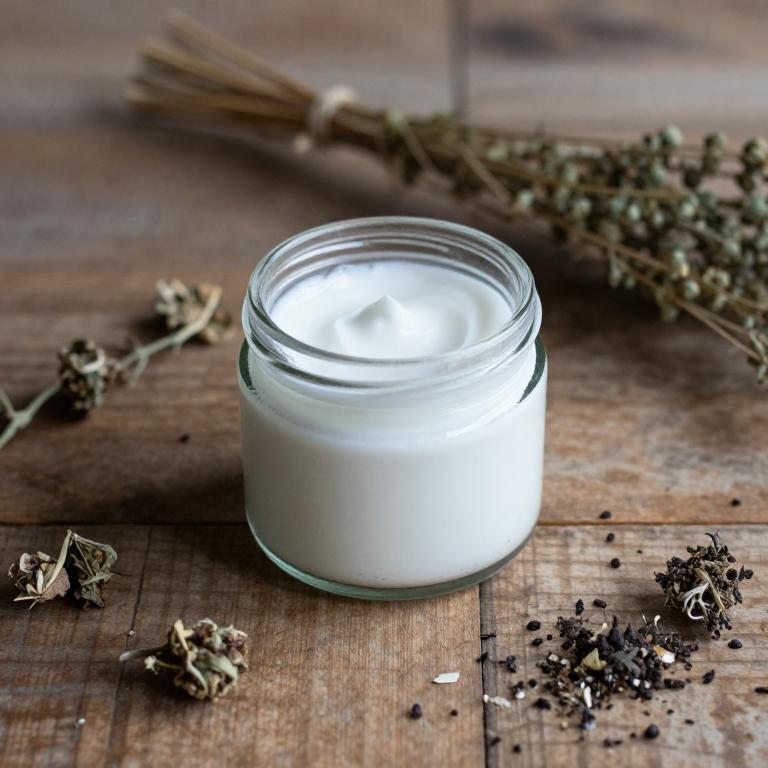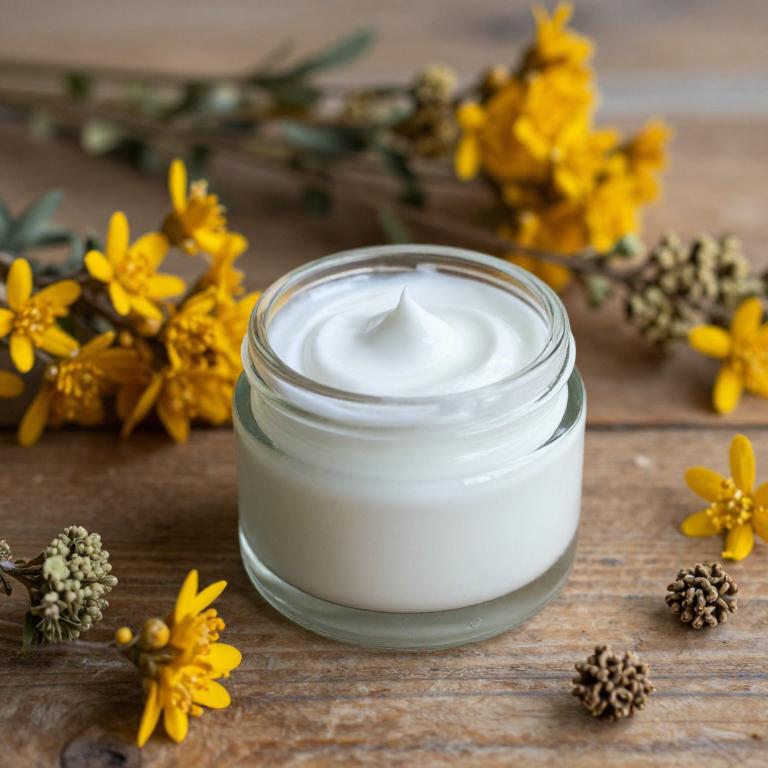10 Best Herbal Creams For Fungal Infection

Herbal creams are natural remedies commonly used to treat fungal infections such as athlete's foot, ringworm, and jock itch.
These creams typically contain ingredients like tea tree oil, garlic, neem, and coconut oil, which have antimicrobial and antifungal properties. They are often preferred by individuals seeking alternatives to synthetic antifungal medications due to their mild side effects and soothing nature. However, their effectiveness can vary, and they may not be sufficient for severe or persistent infections.
It is advisable to consult a healthcare professional before using herbal creams, especially if the infection does not improve or worsens over time.
Table of Contents
- 1. Aloe vera (Aloe barbadensis)
- 2. St. john's wort (Hypericum perforatum)
- 3. Ginger (Zingiber officinale)
- 4. Salvia (Salvia officinalis)
- 5. English lavender (Lavandula angustifolia)
- 6. Blessed thistle (Cnicus benedictus)
- 7. Lemon grass (Cymbopogon citratus)
- 8. Polium germander (Teucrium polium)
- 9. Black pepper (Piper nigrum)
- 10. Stinging nettle (Urtica dioica)
1. Aloe vera (Aloe barbadensis)

Aloe barbadensis, commonly known as aloe vera, is a natural plant that has been used for centuries for its healing properties.
Aloe-based herbal creams are popular for their ability to soothe and treat fungal infections such as athlete's foot and ringworm due to their antimicrobial and anti-inflammatory effects. These creams contain a variety of bioactive compounds, including polysaccharides, enzymes, and vitamins, which help to reduce inflammation and promote skin healing. The gel from the aloe plant also has moisturizing properties that can help to restore the skin's natural barrier, making it more resistant to fungal growth.
While aloe vera creams may not completely replace antifungal medications, they can be a valuable complementary treatment for mild to moderate fungal infections.
2. St. john's wort (Hypericum perforatum)

Hypericum perforatum, commonly known as St. John's Wort, is a herbal plant that has been traditionally used for its therapeutic properties.
Herbal creams containing Hypericum perforatum are often used to treat fungal infections due to their anti-inflammatory and antimicrobial properties. These creams may help reduce symptoms such as redness, itching, and discomfort associated with fungal infections. The active compounds in Hypericum perforatum, such as hypericin and flavonoids, are believed to contribute to their effectiveness against fungal pathogens.
However, it is important to consult a healthcare professional before using these creams, as they may interact with other medications or have potential side effects.
3. Ginger (Zingiber officinale)

Zingiber officinale, commonly known as ginger, has been traditionally used for its antimicrobial and anti-inflammatory properties, making it a valuable ingredient in herbal creams for treating fungal infections.
These creams often combine ginger extract with other natural components like tea tree oil or coconut oil to enhance their effectiveness against pathogens such as Candida and dermatophytes. The active compounds in ginger, including gingerol and shogaol, are believed to inhibit fungal growth by disrupting cell membranes and reducing inflammation. Using zingiber officinale-based creams may offer a safer alternative to conventional antifungal treatments, especially for individuals seeking natural remedies.
However, it is important to consult a healthcare professional to ensure proper diagnosis and treatment for persistent or severe fungal infections.
4. Salvia (Salvia officinalis)

Salvia officinalis, commonly known as sage, has been traditionally used for its antimicrobial and anti-inflammatory properties, making it a valuable ingredient in herbal creams for fungal infections.
These creams often incorporate sage extract to help combat conditions like athlete's foot and ringworm by inhibiting the growth of fungi. The essential oils in sage, particularly thujone and camphor, contribute to their antifungal effects, providing a natural alternative to conventional treatments. When applied topically, salvia officinalis herbal creams can soothe irritated skin while targeting the underlying infection.
However, it is important to consult a healthcare professional before using these products, especially for persistent or severe fungal infections.
5. English lavender (Lavandula angustifolia)

Lavandula angustifolia, commonly known as English lavender, is often incorporated into herbal creams due to its antimicrobial and anti-inflammatory properties.
These creams may help in the treatment of fungal infections by inhibiting the growth of fungi and reducing associated symptoms such as redness and itching. The essential oils in lavender, particularly linalool and lavandins, contribute to the cream's effectiveness against common fungal pathogens like Candida and Trichophyton. Additionally, the soothing aroma of lavender can provide a calming effect, enhancing the overall experience of topical treatment.
While lavender-based creams may offer natural relief, they should complement, not replace, conventional antifungal treatments as recommended by healthcare professionals.
6. Blessed thistle (Cnicus benedictus)

Cnicus benedictus, also known as the blessed everlasting or sweet everlasting, is a flowering plant that has been traditionally used in herbal medicine for its potential antifungal properties.
Herbal creams containing Cnicus benedictus are often formulated to target fungal infections such as athlete's foot, ringworm, and yeast infections due to the plant's bioactive compounds, including flavonoids and essential oils. These natural ingredients are believed to inhibit the growth of fungi by disrupting their cellular structures and reducing inflammation. The use of Cnicus benedictus herbal creams is favored by individuals seeking alternative or complementary treatments to conventional antifungal medications.
However, it is important to consult a healthcare professional before using these products, especially for severe or persistent fungal infections.
7. Lemon grass (Cymbopogon citratus)

Cymbopogon citratus, commonly known as lemon grass, is widely used in herbal remedies for its antimicrobial and anti-inflammatory properties.
Lemon grass essential oil, derived from the plant, has shown effectiveness in treating fungal infections such as athlete's foot and ringworm due to its ability to inhibit the growth of fungi. When incorporated into herbal creams, it provides a natural and soothing alternative to conventional antifungal treatments. These creams often combine lemon grass with other beneficial herbs like tea tree oil or calendula to enhance their therapeutic effects.
Regular application of cymbopogon citratus herbal creams can help reduce symptoms and promote healing in mild to moderate fungal infections.
8. Polium germander (Teucrium polium)

Teucrium polium, also known as caraway weed, has been traditionally used in herbal medicine for its antimicrobial and anti-inflammatory properties.
Herbal creams containing Teucrium polium extract are often formulated to treat fungal infections such as athlete's foot and ringworm by targeting the causative fungi. The active compounds in Teucrium polium, including flavonoids and essential oils, exhibit antifungal activity that helps inhibit the growth of fungal pathogens. These natural creams are favored by individuals seeking alternative or complementary treatments to conventional antifungal medications.
However, it is important to consult a healthcare professional before using Teucrium polium creams, especially for severe or persistent infections.
9. Black pepper (Piper nigrum)

Piper nigrum, commonly known as black pepper, has been traditionally used in herbal medicine for its antimicrobial and anti-inflammatory properties.
When incorporated into herbal creams, piper nigrum can help combat fungal infections by inhibiting the growth of fungi due to its active compound, piperine. These creams may provide a natural alternative to conventional antifungal treatments, offering relief from symptoms such as itching and redness. The warming effect of black pepper in the cream can also enhance blood circulation to the affected area, promoting faster healing.
However, it is important to consult a healthcare professional before using piper nigrum-based creams, especially for severe or persistent fungal infections.
10. Stinging nettle (Urtica dioica)

Urtica dioica, commonly known as stinging nettle, is a plant that has been traditionally used for its medicinal properties.
Urtica dioica herbal creams are formulated with extracts from this plant and are often used to treat fungal infections due to their anti-inflammatory and antifungal properties. The active compounds in stinging nettle, such as flavonoids and polyphenols, help to reduce inflammation and inhibit the growth of fungi. These creams are generally considered safe for topical use and may offer a natural alternative for those seeking to avoid conventional antifungal treatments.
However, it is advisable to consult a healthcare professional before using any herbal remedy to ensure it is appropriate for the specific condition and individual health needs.